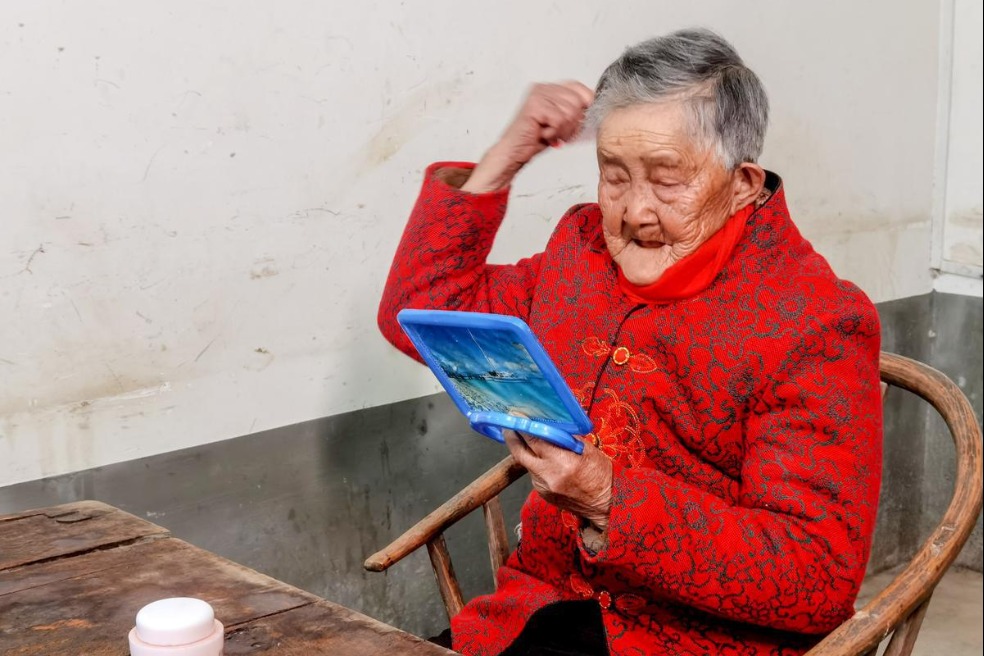Xi's directive changes life in impoverished valley hamlet

Hidden in a valley of the arid mountains between the Loess Plateau and the Qinghai-Tibetan Plateau in Northwest China, the village of Bulenggou was once a remote place with no paved road to the outside world.
Difficult geography and the area's harsh environment meant the village, in Dongxiang autonomous county of Linxia, Gansu province, was plagued by water shortages, ramshackle houses, poor education, low incomes and other severe problems.
But things have changed since Xi Jinping, general secretary of the Central Committee of the Communist Party of China, made a stop at the village during his inspection visit in Gansu on Feb 3, 2013. Xi said great efforts should be made to help the villagers lead a well-off life by ensuring the water supply, building roads and supplying free, better quality housing.
Ma Maizhi, 50, a local farmer who once lived in a house made of mud and straw, has moved into a bungalow in a new housing complex. He said he moved in 2014 and took a new job as a cleaner for his community that earns him 6,000 yuan ($902) annually.
He will have extra income this year because a new grid-linked photovoltaic system means households with solar panels will be eligible for subsidies from the government.
"I had to trudge hours to fetch water from the Taohe River ... when I was young. I never imagined that one day I would have clean water delivered by pipes!"
Local officials also decided on a strategy of training rural laborers to work outside the village to raise incomes. Many men trained as welders, drivers, chefs, mechanics and in other trades.
Ma Hailong, 22, who was paid to train as a cook, works as a chef at an eatery in Dongxiang's county seat, earning 2,500 yuan a month. "Our village now has a concrete road leading to the county seat, so I'm able to commute by motorbike. It's much more convenient for me. I will open a farmhouse restaurant after Zhehong Secondary Road has been built," he said.
Because local women are skilled at sewing, knitting and embroidery, the county's women's federation opened a training center, teaching the women how to make purses, scarves and other handicrafts that can be sold nationwide.
"Making handicrafts at home helps the women strike a balance between earning money and taking care of their families. In such a remote place, men are widely recognized as the family breadwinners. However, we want to encourage these women to be economically independent and build up their confidence," said Wang Xiaomei, deputy director of the Working Committee for Women and Children of Dongxiang county.
Ma Cuimei, 21, has earned 1,200 yuan since she started making handicrafts and recently has become a teacher in the training center. She said she used to be a victim of domestic violence by her ex-husband, on whom she depended economically, but she now is self-reliant.
Animal husbandry, a traditional source of income, has been boosted by the Runze Breeding Co, in which some villagers own shares.
Company owner Ma Dawude returned to his hometown at the end of 2015 and invested 2.6 million yuan to open the company. Local government helped him get a 2 million yuan loan and suggested he run things as a cooperative. "I had been running a breeding business outside my hometown for 16 years. After President Xi visited Bulenggou village, I was so surprised by the changes I decided to pursue a well-off life along with my fellow villagers," he said.
- 4th TCTCP established: boosting standards for tropical agriculture
- Quzhou emerges as a cultural and tourism destination
- Shanghai sees surge in international arrivals
- Former Moutai chairman under investigation for misconduct
- Shanghai railway staff becomes popular with rapid typing, spoken English
- Giant pandas celebrate first year in Chongqing with snowy spectacle





































